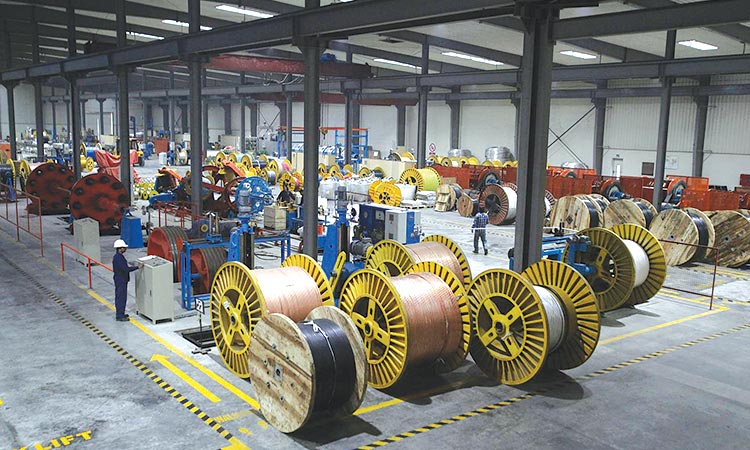 A worker monitors an automatic copper wire unit at the Fast Cables plant in Lahore, Pakistan. Reuters
A worker monitors an automatic copper wire unit at the Fast Cables plant in Lahore, Pakistan. Reuters
Adviser to Prime Minister on Commerce Abdul Razak Dawood says Pakistan’s exports have increased by seven per cent as production line had gone up despite difficult environment.
Talking to Chairman Faisalabad Industrial Estate Development and Management Company, Mian Kashif Ashfaq in Lahore, Razak Dawood said the trade gap is narrowing down as exports are showing steadying trajectory while imports have reduced by four billion dollars.
Chief Operating Officer FIEDMC Aamir Saleemi was also present on this occasion.
Terming the project of Allama Iqbal Industrial City imperative for industrial development in the country, the Adviser said projects like Faisalabad Industrial Estate Development & Management Company (FIEDMC), would help the industry generating economic activities by attracting foreign and local investors besides enhancing volume to exports to meet the challenges of trade deficit.
Razak Dawood said Pakistan’s exports went up by 7 per cent as production line had gone up despite difficult environment.
“The trade gap was narrowing down as exports were showing steadying trajectory while imports got reduced by $4 billion and overall current account deficit also improved,” he added.
He said that the situation on economic front was not as bad as being portrayed by some quarters and they were ready as well to correct things. However, he also conceded that the economic situation must have improved at much accelerated pace.
He said that the exports of garments went up by 29 per cent, cement 25 per cent, basmati rice 21 per cent and footwear 26 per cent in the current fiscal year.
Abdul Razak Dawood said that the government provided subsidy to export-oriented sector on electricity and gas and it would be continued in coming year.
FIEDMC Chief Mian Kashif Ashfaq unfolding the distinctive features of Allama Iqbal Industrial City to Advisor said this sole project would house as many as 400 industries besides giving employments to 2,500, 00 people. He said approximately Rs400 billion foreign and local investments would be pumped into this project and development project is being carried out on fast track.
He further said FIDEMC always provided state of the art facilities to its customers besides resolving their issues through one window operation on top priority basis. He said the confidence of the investors on is being restored after completion of M3 project.
Mian Kashif said that Prime Minister Imran Khan has changed the image of the country within a short span of time since he formed the government in August last year. “Pakistan which suffered huge economic losses during the last 20-years due to militancy and war against terror, has now come out as a progressive new country under Imran’s leadership,” he added.
He appreciated Abdul Razak Dawood for taking serious steps for the revival of national economy. He said Pakistan’s economic indicators are now improving and soon the government would announce relief packages for the poor strata of the society.
He also said FIEDMC was committed to improve Pakistan’s ease of doing business ranking to under 100 within two years to attract international investors to the country.
Meanwhile a well renowned personality of Maritime Sector Chairman Pakistan Ship’s Agents Association (PSAA), Vice President Pakistan Stevedores Conference Ltd (PSCL), and Former Vice President Federation of Pakistan Chambers of Commerce & amp; Industry (FPCCI) Tariq Haleem says that the Pakistani nation, industrialists and the business community should not be disheartened.
For speedy recovery of economic activities the importance of ports has increased many folds as compared to the past and this is an admitted fact that Pakistani ports have special position for improvement of the country’s economy.
Tariq Haleem said that to keep pace with the modern fast improving world economical development we should immediately provide better facilities at our ports and take steps on war footing to reduce operational costs.
Certain amendments in relevant SRO’s are required to make Gwadar Port and Gwadar Free Zone operational. Huge investment is pending due to delays in the amendments. Afghan Transit Trade issues need to be addressed to bring back our lost revenue generating cargoes.
We believe that with dedication and honesty PM Imran Khan will Inshallah soon overcome the problems being faced by the country and he will lead the country’s economy into a stable environment. In a recent statement he mentioned that the need of the hour is for all of us to provide our trust and support to the present government.
However the government should also take the citizens of Pakistan into confidence to overcome the trust deficit “if any”. For the progress and well being of Pakistan all sectors will have to play their role.

 A worker monitors an automatic copper wire unit at the Fast Cables plant in Lahore, Pakistan. Reuters
A worker monitors an automatic copper wire unit at the Fast Cables plant in Lahore, Pakistan. Reuters